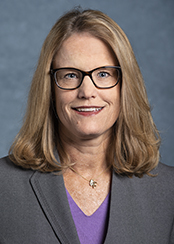Cedars-Sinai Blog
Tackling Cancer With Targeted Therapy
Nov 22, 2021 Nicole Levine

Dr. Karen Reckamp and DiAnn Smith were honored at the Rams game, holding white ribbons in honor of Lung Cancer Awareness Month.
The very first time DiAnn Smith stepped into SoFi Stadium, she cheered on the Rams—but there was another team she came to support as well: lung cancer survivors.
She hoisted up a large white ribbon and gave one to Dr. Karen Reckamp, her oncologist at Cedars-Sinai. Like pink ribbons for breast cancer awareness in October and pale blue ribbons for prostate cancer awareness in September, the white ribbons aim to raise awareness of lung cancer. They also carry an additional message: Anyone with lungs can get lung cancer.
DiAnn would know. When she was first diagnosed with lung cancer in 2007, she hadn't touched a cigarette in more than 15 years.

Karen L. Reckamp, MD
"You can be walking around feeling OK, and not even know you have lung cancer. Screening can save a lot of lives."
"Back when I quit smoking in 1992, they were saying if you haven't smoked in five years, your lungs go back to normal—they're pink and healthy, and you're free," says DiAnn, 74. "That wasn't the case, because my lung cancer showed up in 2007."
According to the American Cancer Society, within 10 years of quitting, a person's risk of lung cancer is about half that of someone who is still smoking. As many as 20% of lung cancers in the U.S. occur in people who never smoked or smoked fewer than 100 cigarettes in their lifetimes.
"Lung cancer has many risk factors, and in some cases, we cannot be entirely sure why someone developed lung cancer—since even those who have never smoked can develop lung cancer," Dr. Reckamp says. "We're still trying to identify all the environmental factors that might be contributing to lung cancer."
DiAnn, who lived in North Carolina at the time, went to her doctor because she had a persistent cough. A first round of antibiotics did nothing to improve it. Then, for the first time in her life, she was prescribed a second round of antibiotics to treat the cough.
"By Thanksgiving of that year, I was just in really bad shape," DiAnn says. "They did some imaging tests, and they found a 5-centimeter mass in my chest."
Surgeons removed the right upper lobe of her right lung, and she took two rounds of chemotherapy. She committed to physical therapy to keep her lungs strong. She continued with pulmonary therapy, walking on a treadmill and doing other cardio exercises, for the next six years.
During that time, she also sought out support from other lung cancer survivors. The groups were scarce and grassroots, but she found a community of survivors like herself. They gathered in meetings and also provided what DiAnn describes as a "telephone ministry," working with hospitals to connect survivors with people who are actively in treatment for lung cancer. Their group's work expanded, even hosting an event at a prominent hotel in Greensboro, North Carolina.
"I became a poster child for lung cancer," she says.
During a regular follow-up in 2017, her doctors found new traces of cancer in her lungs, this time in her left lung. Her team in North Carolina adopted a watchful waiting approach, and when DiAnn moved to California in 2019, they referred her to Dr. Reckamp.
After evaluating her, Dr. Reckamp recommended a completely new approach for DiAnn: targeted therapy. In recent years, powerful new medications that target cancers based on their specific mutations emerged. DiAnn's cancer carries a mutation that's been shown to respond to these medications.
She started on a drug requiring two doses a day, and when she didn't like that regimen, was able to switch to a different targeted medication. She continues to take the medication daily, and recently reduced her quarterly follow-up appointment to just three times a year.
Like many health conditions, lung cancer affects some groups disproportionately. In the U.S., Black Americans are especially hard hit by lung cancer, experiencing higher incidence of lung cancer, lower survival compared to white patients and more challenges accessing care.
"Nationwide, not enough people have tumor testing for genes that make targeted therapies possible, and this is especially true of minority groups," Dr. Reckamp says. "At Cedars-Sinai, we test so that all of our patients have the potential to receive targeted therapies."
In most cases, these tests are conducted by testing of the original tumor biopsy or a simple blood draw.
Increasing access to care is one of the reasons DiAnn stays involved with lung cancer activism and hopes to start her own group for survivors locally. She's especially interested in getting the word out about lung cancer screening.
"You can be walking around feeling OK, and not even know you have lung cancer," she says. "Screening can save a lot of lives."
Her daily targeted therapy pill gives her reassurance that her lung cancer is being addressed.
"I'm so grateful Dr. Reckamp found a targeted therapy for me," DiAnn says. "Before, nothing was bothering me, but something was going on in my lungs. Now my mind is at ease because I know that something's taking care of whatever is happening inside my lungs. It's keeping the cancer at bay."




